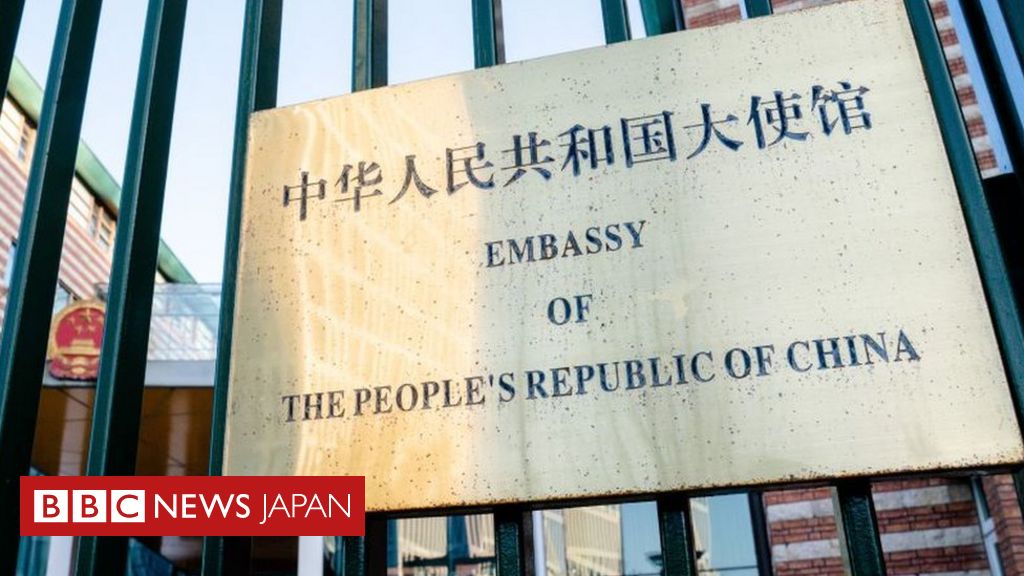By Anna Horrigan, BBC News, The Hague, The Netherlands
image provided, Getty Images
Chinese Embassy in The Hague, the Netherlands
The Chinese government has been accused of setting up at least two undeclared “police offices” in the Netherlands.
Dutch media reported Wednesday that they found evidence of China’s use of “overseas gas stations” charged with providing diplomatic services to silence dissidents in Europe.
A spokesman for the Dutch Foreign Ministry said it was illegal for Chinese police to have an unofficial branch.
The Chinese embassy in the Netherlands said they were unaware of its existence.
Dutch authorities have launched an investigation. It all started with a title titled “Chinese Transnational Policing Gone Wild” published by the Spanish NGO Safeguard Defenders.reportwas.
According to the NGO, the public security offices of two Chinese provinces have set up a total of 54 “overseas police service centers” in 21 countries on five continents. Most are located in Europe, with nine in Spain and four in Italy. In the UK, there are two in London and one in Glasgow.
Apparently, it was created to tackle international crime and perform administrative tasks such as renewing Chinese driver’s licenses. But in practice, Safeguard Defenders says it is conducting “persuasion operations” to force the return of those suspected of making anti-Chinese statements.
Dutch news agency RTL News and Follow the Money investigative platform accused Chinese dissidents of being persecuted by Chinese police in the country.I told the story of Mr. Wang Jingyu。
This year, he said, he received a call from someone claiming to be affiliated with the “Overseas Police Service Center”.
At the time, he was strongly urged to return to China to “solve his problems”. “And think about your parents,” he said.
Since then, she has been subjected to systematic harassment and intimidation. He believes that Chinese government agents are orchestrating it.
Dutch intention to investigate and protect
The Chinese embassy in the Netherlands told RTL News that it is unaware of the existence of such a police branch.
“The Dutch government has not heard of such an initiative from the Chinese government through diplomatic channels. It is illegal,” said Maxim Hovenkamp, a spokesman for the Dutch Ministry of Foreign Affairs.
He also explained that the government must investigate and determine the appropriate response. “It is very disturbing to hear that Chinese citizens are being threatened and harassed here in the Netherlands. We are looking into ways in which the police can provide protection for the man,” she reads.
Tasks such as renewal of passports and visa applications are usually handled by embassies and consulates. In these places the diplomatic rules established by the Vienna Convention apply. Both the Netherlands and China are parties to the treaty.
Police branches, such as those criticized by China, can undermine the territorial integrity of host countries by evading the protections offered to them by their jurisdictions and laws.
Wang Wenbin, a spokesman for China’s Ministry of Foreign Affairs, said on Monday that what foreigners call police outposts are in fact “service stations for overseas Chinese.” China fully respects the jurisdiction of other countries, he said.
Furthermore, after claiming that many Chinese have not been able to return home due to the effects of the novel coronavirus, “To help these people overcome difficulties, the relevant local governments have opened online service platforms.” they are mainly used for health checks and the rewriting of driving licenses “.
threatened to force him to return home
Safeguard Defenders said China’s crackdown tactics are “problematic” in targeting suspects without firmly establishing links to crimes or following due process of the host country.
The main tactics of the repression are coercion and intimidation, which are used to “persuade” alleged runaway families to return home, the NGO said.
On September 2, China passed the anti-telegraphy and online fraud law. This established extraterritorial jurisdiction over Chinese citizens around the world suspected of such fraud.
In theory, the new law and overseas Chinese police forces will leave dissidents with nowhere to go.
The Dutch government is under pressure to protect Chinese dissidents who have been granted asylum in the Netherlands and to prove that Dutch law takes precedence in the Netherlands.


